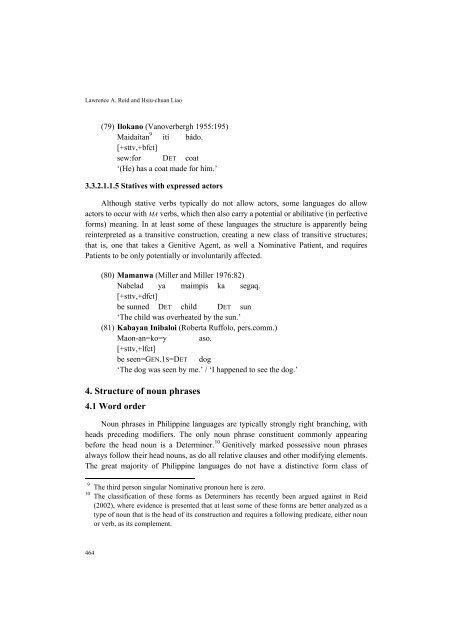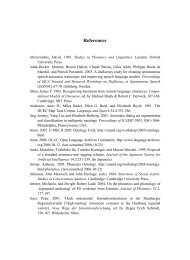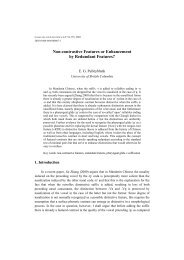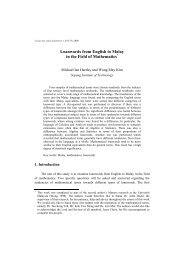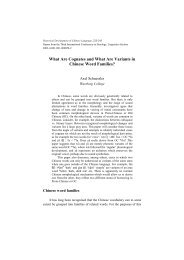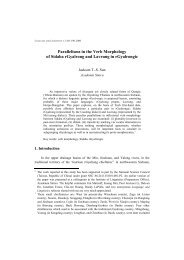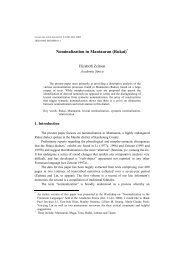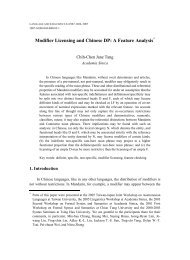A Brief Syntactic Typology of Philippine Languages - Academia Sinica
A Brief Syntactic Typology of Philippine Languages - Academia Sinica
A Brief Syntactic Typology of Philippine Languages - Academia Sinica
Create successful ePaper yourself
Turn your PDF publications into a flip-book with our unique Google optimized e-Paper software.
Lawrence A. Reid and Hsiu-chuan Liao<br />
464<br />
(79) Ilokano (Vanoverbergh 1955:195)<br />
Maidaítan 9 ití bádo.<br />
[+sttv,+bfct]<br />
sew:for DET coat<br />
‘(He) has a coat made for him.’<br />
3.3.2.1.1.5 Statives with expressed actors<br />
Although stative verbs typically do not allow actors, some languages do allow<br />
actors to occur with MA verbs, which then also carry a potential or abilitative (in perfective<br />
forms) meaning. In at least some <strong>of</strong> these languages the structure is apparently being<br />
reinterpreted as a transitive construction, creating a new class <strong>of</strong> transitive structures;<br />
that is, one that takes a Genitive Agent, as well a Nominative Patient, and requires<br />
Patients to be only potentially or involuntarily affected.<br />
(80) Mamanwa (Miller and Miller 1976:82)<br />
Nabelad ya maimpis ka segaq.<br />
[+sttv,+dfct]<br />
be sunned DET child DET sun<br />
‘The child was overheated by the sun.’<br />
(81) Kabayan Inibaloi (Roberta Ruffolo, pers.comm.)<br />
Maon-an=ko=y aso.<br />
[+sttv,+lfct]<br />
be seen=GEN.1S=DET dog<br />
‘The dog was seen by me.’ / ‘I happened to see the dog.’<br />
4. Structure <strong>of</strong> noun phrases<br />
4.1 Word order<br />
Noun phrases in <strong>Philippine</strong> languages are typically strongly right branching, with<br />
heads preceding modifiers. The only noun phrase constituent commonly appearing<br />
before the head noun is a Determiner. 10 Genitively marked possessive noun phrases<br />
always follow their head nouns, as do all relative clauses and other modifying elements.<br />
The great majority <strong>of</strong> <strong>Philippine</strong> languages do not have a distinctive form class <strong>of</strong><br />
9 The third person singular Nominative pronoun here is zero.<br />
10 The classification <strong>of</strong> these forms as Determiners has recently been argued against in Reid<br />
(2002), where evidence is presented that at least some <strong>of</strong> these forms are better analyzed as a<br />
type <strong>of</strong> noun that is the head <strong>of</strong> its construction and requires a following predicate, either noun<br />
or verb, as its complement.


